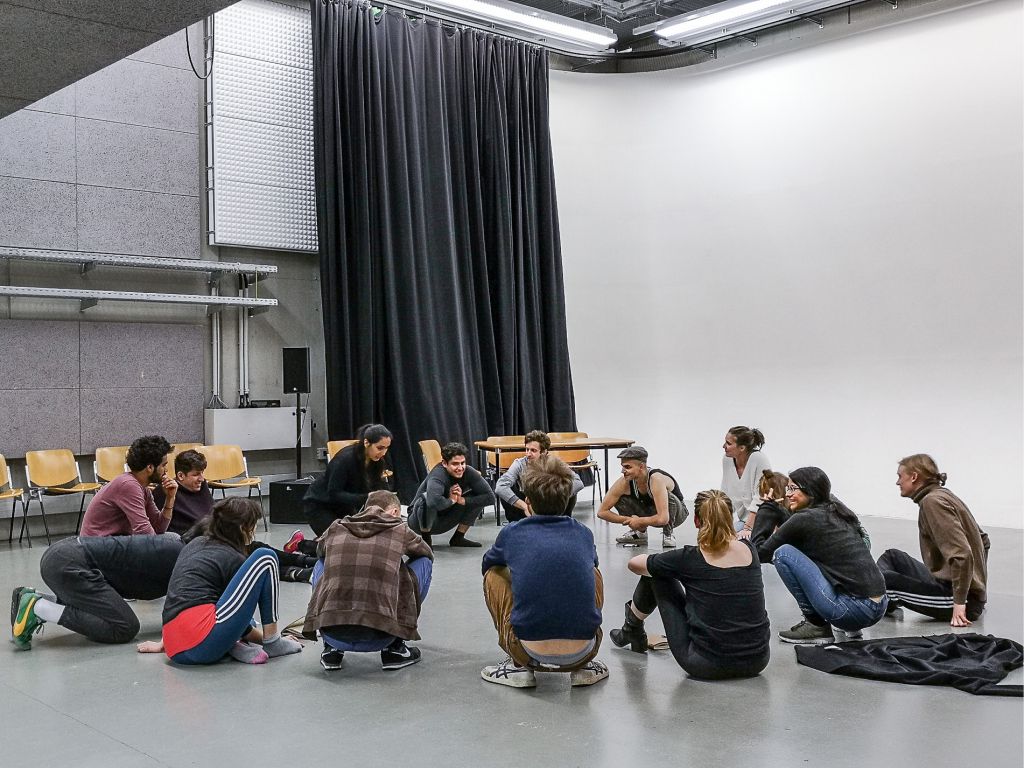The artistic research project Confronting Realities delves into the hot topic of artists’ social backgrounds while also shedding light on film production’s limitations and opportunities.
Acting, making movies, doing art—it sounds like freedom, endless realms of contemplation, independence. Which it very much is, say Bruno Kratochvil and Tamim Fattal, who are realising the filmic essay Dreamers. Disformed figures of our past as part of a pilot project together with Negin Rezaie and Enzo Brumm. But even so, the dream factory has a lock on its workers—for it is indeed a factory in the truest sense, one that categorises, sets up hierarchies, and produces both inclusion and exclusion in the process. Do one’s own life story, one’s own hopes and dreams have any place in what’s often a hierarchical production environment? Is there, in fact, any opportunity at all to tell of them in the face of diverse exclusionary mechanisms ranging from origins to social status, age, gender, and religion?
Confronting Realities is looking to facilitate precisely such telling: this artistic research project equips its participants with theoretical and practical tools that empower them to relate their own social biographies via moving images. In a workshop and subsequent film lab, six students of Film Academy Vienna are currently working together with eight performers to explore the origins and life realities of all participants as storehouses of material for filmic storytelling. Barbara Wolfram, who is supervising this project at Film Academy Vienna together with Nina Kusturica, Christina Wintersteiger, and Elena Meilicke under the overall leadership of Claudia Walkensteiner-Preschl, has derived special benefit from working as an artistic researcher with the performers in her own Evolve Theatre Company, who hail from diverse social backgrounds. And with this project, she’s looking to move away from the rather homogeneous arts university backdrop and provide participants with an opportunity to adopt new perspectives. Because in dealing with our own biographies, says Wolfram, we soon see just how many things we’ve been taking for granted without even realising it. “We’re extremely privileged. So I view it as our obligation to become acquainted with life realities that diverge from our own. We can’t compensate for others’ fates, but we can confront ourselves with the lives they live. And it’s our responsibility to portray the realities experienced by others in our films as these people actually feel and live them—rather than just imagining how the world works on our own.”

Confronting Realities is situated at the highly charged interface between self-reflection and external perception. So in addition to basic theoretical concepts, the preparatory group work here focuses on feeling and the body. “Getting out of one’s own head” is the name of the game: Wolfram, herself a theatre professional, psychologist, and film studies PhD candidate at Film Academy Vienna, guides the participating students and performers in approaching their own social autobiographies by way of various strategies. Attentiveness exercises as well as the investigation of self- and group-perception are meant to additionally facilitate getting to know one’s own biography as it is anchored in one’s body—for instance by encouraging participants to recall smells, tastes, and sounds. A questionnaire serves to introduce participants to biographical work in the context of social class. And the unconscious mind likewise plays a central role in this investigation: using two further questionnaires, one biographical and one abstract (e.g., “How do I make a cup fall in love with me?”), participants are asked to specify their emotions while also trying to discern unconscious exclusionary mechanisms.
From the very beginning, Barbara Wolfram and her team were aware that this approach would involve intimate topics and strong feelings: “It’s important to pick the participants up were they are. So we try to prepare ourselves for the emotions that might arise—with shame being one of particular thematic importance when dealing with social autobiographies. And as a general rule: anything can be said, but nothing must.”
The intense work engaged in by the members of the three project groups that were created engenders the trust that’s necessary in order to do work that references difficult life experiences. In the project Dreamers. Disformed figures of our past, screenplay writing student Bruno Kratochvil translates the life realities of three performers into the medium of film: Tamim Fattal is a Syrian man who has been granted asylum and is now a successful member of the Theater in der Josefstadt’s ensemble of actors, Enzo Brumm is a fashion model from Hamburg who studies at the Max Reinhardt Seminar, and Negin Rezaie is an artist and performer who fled from Iran and now lives in Vienna with no asylum having been granted. Together, these artists look at the social conditions inscribed on their biographies—ranging from visas to ideals of beauty and notions of gender.
This group seeks to juxtapose and counter its individual and highly divergent life experiences with commonalities. And for Bruno Kratochvil, this conflicting quality is ever-present: “I can’t authentically tell you the story of how it was for Tamim or for Negin when they were on the run. But what I can do is give them space in which to tell their stories. I also look for images capable of reflecting a feeling or impressions that they had back then—and these are easy to find in other people’s lives. Because after all, we’re all united by things like loneliness, love, sadness, and—last but not least—our dreams and hopes.”
For Kratochvil, Confronting Realities is becoming something of a megaphone: stories want to be told first and foremost because they seek to point something out—and in doing so, they become political. Emotions visible onscreen are likewise political; after all, they highlight things that are deeply touching or embody problems. Such description and portrayal are therefore possessed of an immense power that Kratochvil views as being central to this project: “It makes it possible to abandon this passive stance—where others look at you and ascribe things to you—and arrive in one that’s active, creative.”

